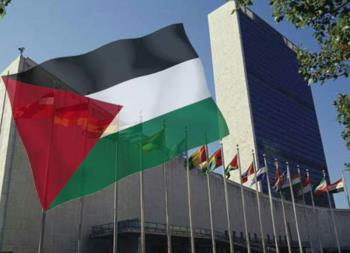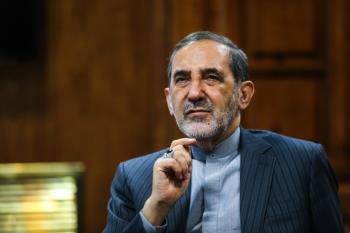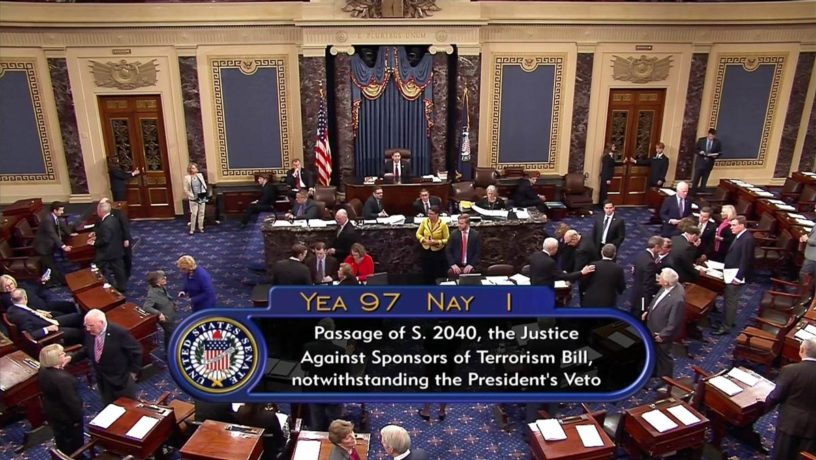Alwaght- The US Congress on Wednesday overrode a veto by President Obama on a bill to allow the families of Sept. 11 victims to sue Saudi Arabia for the regime's backing of the attackers.
The bill allows courts to waive claims to foreign sovereign immunity in situations involving acts of terrorism on US soil thus effectively amending a 1976 law providing countries immunity from US lawsuits.
Obama argued that the bill “could be devastating to the Department of Defense and its service members.” He said that “there is no doubt that the consequences could be equally significant for our foreign affairs and intelligence communities.”
The Senate passed the bill 97-1 and the House voted 348-77, the first time Congress has rejected a veto by Obama.
The vote has been described as a blow to Obama as well as to Saudi Arabia, one of Washington's longest-standing allies in the Arab world.
Obama said he thought the Congress had made a mistake, reiterating his belief that the legislation set a dangerous precedent and indicated that he thought political considerations were behind the vote.
"If you're perceived as voting against 9/11 families right before an election, not surprisingly, that's a hard vote for people to take. But it would have been the right thing to do," he said on CNN.
The legislation was passed by the House of Representatives earlier this month, in the aftermath of the release of 28 pages of secret government documents detailing the role of the government of Saudi Arabia in the September 11, 2001 terror attacks that killed nearly 3,000 people. It has been sponsored by organizations representing September 11 victims and their families who aim to sue the Saudi government which is deeply implicated in the attacks.
Saudi Arabia was home to 15 out of 19 of the hijackers, as well as al Qaeda leader Osama bin Laden. Saudi ties to the 9/11 attacks were confirmed by the 28-page segment from the report issued by the “Joint Inquiry into Intelligence Community Activities before and after the Terrorist Attacks of September 11, 2001,” released to the public last July.
Obama Disregards 9/11 Victims for Geopolitical Interests
Notwithstanding the political posturing on the 9/11 bill, the fact is that American have a right to file complaints in the country's court and the move by the White House to attempt to curtail that right is a blatant violation of people's rights and is contrary to established human rights.
Obama's decision to veto the bill was in total disregard to thousands of victims for the sake of geopolitical interests.
The argument that the US economy could potentially lose $750 billion in the event that Saudi Arabia goes ahead with its threats to sell off Treasury securities and other American assets seems to him also not credible. Riyadh lobbied furiously for the bill to be scrapped, thus its threats to sell its securities was hot air as it is bound to suffer more if it makes such a move.
On the other hand, squarely blaming the Saudi regime for 9/11 attacks is a way of covering up who was really behind the attacks and forcing the public to believe the official version of the incident which still has many unanswered questions. The al-Qaeda terrorist group which is blamed for the 9/11 attacks is known to have been established and supported by Saudi Arabia in liaison with the US Central Intelligence Agency, CIA.
The decision by Congress to allow American citizens to sue the Saudi regime officials is in itself and admission of the terrorist nature and identity of the regime which Washington has been protecting all along despite concrete evidence of its connections to terrorists and terror groups worldwide. US Defense officials also say US troops in Saudi Arabia might face threats after Congress overrode Obama's veto.
US-Propped Monarchies a Nightmare for Americans
The US government has been propping up tyrants and dictatorial monarchies in the West Asia region including Saudi Arabia. These monarchies have been used for nefarious US political and economic interests in the region including igniting a myriad of crises. The US allies are now turning into a nightmare for Americans due to their support of terrorists groups.
The latest decision by US legislators could signal a major change in the relationship between the Saudi regime and the west over its involvement in terrorism and religious extremism.
Many security analysts believe that there is a connection between the amount of Saudi and Wahhabi money that goes into parts of the globe and the success of terrorist recruiters. The Saudi regime spends millions of dollars every year on thousands of Wahhabi mosques, schools and clerics around the world. Sunni Muslim scholars who met recently in Chechenya described Wahhabism as the most dangerous deviation since it sanctions violence against non-believers, including Muslims who reject Wahhabi interpretation. ISIS, al-Qaeda, Boko Haram, al-Shabab and the Taliban terrorist groups are all adherents to this creed which is practiced officially in Saudi Arabia.
Despite using millions of dollars to whitewash its battered image among common Americans, this time the Saudi regime will find it hard to redeem it completely tainted image not just in America, but globally
US-Saudi Divergence
By the year 2030 two major changes will occur in the international arena thus changing Washington-Riyadh ties.
First, China will overtake the US as the largest economy in the World. Secondly, by 2030, the US will not only stop importing crude oil, but will extract its own shale oil deposits and become a major crude oil exporter.
Saudi royals once walked in and out of the White House without protocol limitations. All that is set to change. In a few years to come, the US will no longer need. Current Washington-Riyadh ties are based on the premise of 'world's largest producer of crude oil and world's largest consumer of crude oil'. This will change to 'producer-producer' and thus US and Saudi Arabia will be competitors in crude oil production.
China is increasingly becoming Washington's priority and the US focus is shifting from the Persian Gulf to the South China Sea.
Riyadh-Washington divergence will continue and the rift between these two allies will group and this will be to the advantage, of the main Saudi rival in the region, Iran which has been pushing for a West Asia region devoid of US presence.



























